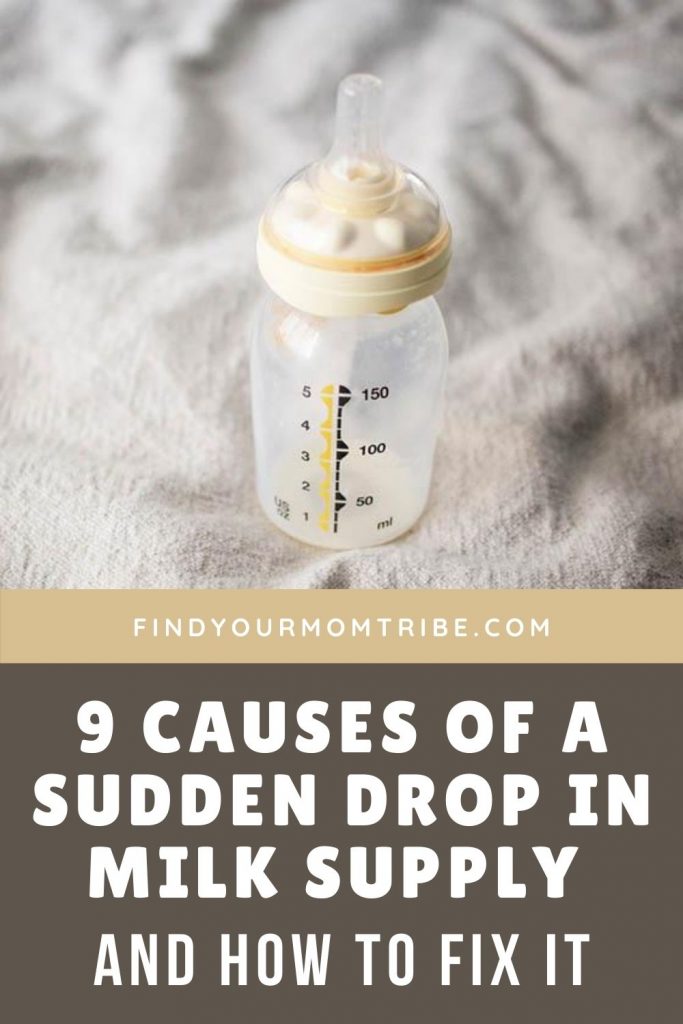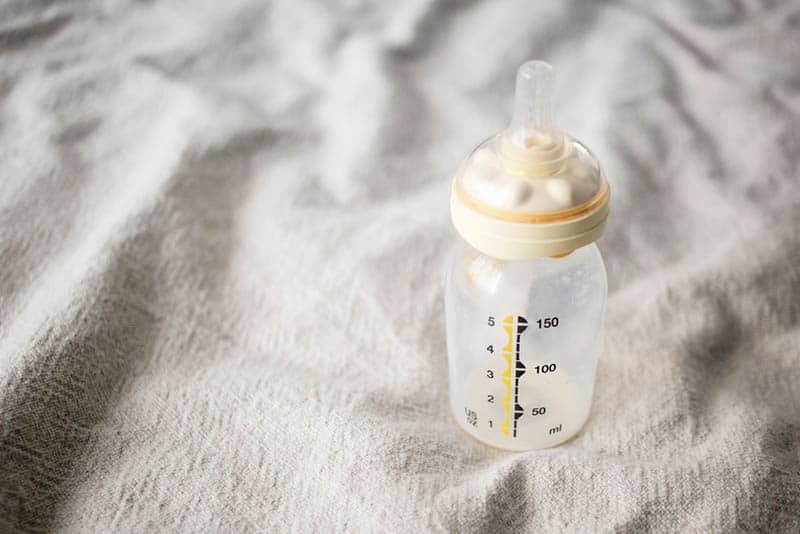There’s nothing more demoralizing to your breastfeeding journey than when you have a sudden drop in milk supply despite your best efforts to keep your little one nursing.
If you have noticed that your milk supply is decreasing, don’t freak out! This is very common and happens for a variety of reasons, ranging from not getting enough sleep to your period returning.
What’s more, an unhealthy diet or habits such as smoking and drinking can have a negative impact on your supply, as well as trying to nurse on a schedule rather than when the baby is hungry.
The most important thing to remember is to not let the drop in your production of milk discourage you!
Most breastfeeding moms find that their supply goes back to normal after following a few easy strategies.
They include power pumping, eating delicious lactation cookies, and using warm compresses to get the milk flowing again.
So, read on to get all the details on what causes a sudden drop in milk supply and how to treat it.
9 Causes Of A Sudden Drop In Milk Supply
The reasons behind a new mom’s sudden low milk supply can vary, depending on her lifestyle, overall health, and wellbeing. Some moms even find that one breast produces less milk than the other.
If you find that you have been doing everything in your power to get your breast milk supply back to normal but it’s not working, speak to a lactation consultant who will be able to help you.
1. Stress

Stress, whether it be in your personal or professional life, can have a very negative effect on your health in general, including your milk production.
When you factor in the additional anxieties of low milk supply, you get one stressed mama!
The tricky thing about stress is how it creeps up on you and you don’t even notice until it has taken a toll on your health.
A telltale sign of stress is feeling tension in your body, even when you’re in an environment that’s supposed to be relaxing. You might also have frequent headaches or pain in your shoulders and neck.
Regardless of what your symptoms are, you need to find a way to release the tension from your body and to relax, otherwise, you might not go back to producing enough milk for your little one.
Relieving stress can be as simple as getting a massage, taking part in a yoga class, or going for a run – any physical activity that you enjoy and that will activate your muscles.
In case you didn’t know, exercising releases endorphins, also known as happiness hormones.
That’s why getting active and working out is a surefire way of getting a grip on the stress in your life.
2. Hormonal birth control

According to the La Leche League, hormonal birth control (especially that which contains estrogen) can have a negative impact on your breast milk production.
Hormonal birth control includes contraceptive pills but also IUDs (intrauterine devices), vaginal rings, and any other device that uses hormones to prevent pregnancy.
So, if you have recently started a new birth control containing hormones and you’re producing less milk than usual, then this could be the reason behind your sudden drop in milk supply.
Even moms who have been breastfeeding for a while and have never had any problems with a supply drop have found that hormonal birth control has impacted the amount of milk they produce.
Luckily, there are numerous birth control methods that you can rely on and that won’t impact your supply, including:
- using a diaphragm or condom;
- a non-hormonal IUD.
Apart from an International Board Certified Lactation Consultant (IBCLC), your gynecologist can also help you find a method of contraception that won’t interfere with your precious milk supply!
3. Exhaustion

Lack of sleep that leads to exhaustion goes hand in hand with stress (sometimes it feels like they feed off each other!) and can cause new mothers to experience a low supply of breast milk.
Now, it’s perfectly normal for you to feel tired in the weeks after your munchkin’s arrival! But don’t trick yourself into thinking that feeling downright exhausted every day is how you should feel all the time.
In fact, postpartum fatigue and lack of sleep can cause you to not produce enough breast milk and can put a premature end to your breastfeeding journey.
One of the best ways to prevent postpartum exhaustion is to sleep or take a quick nap when the baby is sleeping, too.
Obviously, your ability to do so depends on whether you have more children and if your partner is also on leave and can help during the day.
It’s very tempting to use baby’s naptime as an opportunity to tackle household chores but your rest should be a priority during this time!
Don’t be afraid to ask a family member or a friend for help – chances are that they would love to jump in and give you a helping hand.
During this period, it’s best to postpone any visits that aren’t of a helping nature as you probably don’t feel like cleaning and cooking a nice dinner for your guests.
4. Baby’s growth spurt

In the first year of your munchkin’s life, she will experience a number of growth spurts.
During these spurts, she will want to breastfeed more often than usual – some babies even nurse on an hourly basis – and your milk supply might have trouble keeping up.
For breastfeeding mothers, this can be a frustrating period, because they can feel like they can’t provide what their baby needs.
Thankfully, the changes to the baby’s feeding habits aren’t permanent and once the growth spurt is over, you can expect your little one to feed less often.
Remember that a growth spurt isn’t necessarily related to physical changes, such as gaining weight (make sure to track your little one’s weight at home with a baby scale) or growing taller.
Your baby can also feed more often when she’s going through important baby leaps and milestones such as learning how to crawl or talk.
In addition, you can expect your supply to drop once your little one starts eating solid foods and sleeps for longer stretches during the night.
5. Poor diet

Unfortunately, paying attention to the food we eat on a daily basis is not a priority for many of us, especially new parents who don’t have time to cook and use fresh produce in their meals.
When you combine that with the easy availability of fast food (that’s often cheaper than healthy food) and frozen ready meals, you get a recipe for a very unhealthy diet.
RELATED: What Not To Eat When Breastfeeding: Specific Foods To Avoid
If you’re one of the lucky ones, maybe you haven’t even noticed the effects of your poor diet until now when you’re experiencing a sudden drop in milk supply.
A healthier diet and a breastfeeding meal plan will not only be beneficial to your supply of milk but your overall well being, too, and can help with losing any pregnancy weight gain.
What’s more, don’t replace your water intake with soft drinks that are full of sugar – staying hydrated with just water is really important!
Then, there are certain ingredients that moms believe have a negative effect on their production of milk.
These include sage and peppermint (including anything menthol-flavored) so try and avoid them if you would like to have a healthy milk supply.
Oregano is another herb that goes on the list of foods to avoid, as well as jasmine and parsley.
6. Getting your period

It’s not uncommon for breastfeeding moms to miss their period for a number of months after they give birth, depending on how often they nurse and whether they are supplementing with baby formula.
Whenever your period does return, you can expect it to have an effect on your milk production. In fact, the second half of the cycle has been linked to a decreased supply of milk.
As is usually the case, the reason lies in the hormonal changes a woman’s body goes through in the weeks and days leading up to her period.
RELATED: 6 Signs Of Ovulation While Breastfeeding And How To Spot Them
Thankfully, you can offset these fluctuations by taking a magnesium and calcium supplement during the second half of your cycle – a lactation consultant can help you decide on a dose and the exact time frame when you should take it.
7. Taking decongestants

While catching a cold is harmless, trying to care for a baby and function normally with a congested nose and a head that feels like a giant balloon is far from ideal!
Decongestants, or medication to help ease congestion, are usually the first thing we reach for to treat the symptoms of the common cold.
However, many of these medications contain pseudoephedrine, a chemical that can disrupt your milk flow and production.
So before you purchase an over-the-counter treatment for your cold, make sure it’s pseudoephedrine-free and also safe to use while breastfeeding.
Although many moms have taken decongestants without experiencing a sudden drop in milk supply, you should definitely be aware of this potential side-effect.
The good news is that even if you have taken decongestants and discovered that your supply has dropped, it’s not the end of the world!
The drop is only temporary and will go back to normal.
Plus, there are many other ways of relieving congestion without taking decongestants, such as using essential oils or drinking tea.
Remember, most people feel better within a week, so be patient!
And as a rule of thumb, always let your doctor know you’re breastfeeding before they prescribe you any medication.
8. Nursing on a schedule

It goes without saying that the decision you make about whether you will nurse on demand or on a schedule is up to you and your lifestyle.
However, having a nursing session whenever the baby is hungry, and not on a schedule, or even comfort nursing your baby to sleep, is much better for your milk supply.
Plus, when you’re not following a schedule, you don’t have to worry about how much milk your little one has had – she will let you know when she’s hungry and ready for another nursing session.
When you’re on a schedule, however, it will be very important to you that the baby nurses until she’s full so that you can follow your feeding times.
Apart from that, the more often your baby nurses, the more milk you will produce because your body receives signals that more milk is needed.
And waiting for too long between feedings will not help you build up your milk supply but will have the opposite effect.
9. Smoking and drinking alcohol

Even though we all know that smoking is incredibly unhealthy, getting rid of a nicotine addiction for good is much easier said than done and many former smokers find themselves slipping back into their old habits.
That being said, cigarettes certainly interfere with a healthy breast milk supply.
They disturb the let-down reflex which is responsible for allowing your breasts to release the milk and create a good supply.
While many women stop smoking during their pregnancy, a large number resume the habit after they give birth and if you belong to this group, you can definitely put the blame on cigarettes for the sudden drop in your milk supply.
If you’re struggling with quitting smoking while breastfeeding, your doctor will be able to give you the best advice on how to do so safely and effectively.
Alcohol has a similar effect on your milk production and supply and you should definitely avoid it if you are struggling to produce enough breast milk.
Not to mention that alcohol can get into your breast milk so a mom needs to follow very specific instructions if she wishes to drink while breastfeeding without putting the baby at risk.
Remedies For A Sudden Drop In Milk Supply
It can be very discouraging when you find your milk production is tapering off just when you thought you were on the right track!
But hang in there mama – you’re not the only one with this problem on your hands. In fact, a fluctuating supply of breast milk is the bane of many a mom’s existence.
Because this is so common, though, there are numerous tried and tested remedies and treatments for your sudden drop in milk supply.
1. Pumping

Since many women choose to continue feeding their little one breast milk even after their maternity leave is up, having a breast pump is pretty much a necessity in this day and age.
Even if you haven’t planned on using one just yet, a pump can help you get your supply back on track with something called power pumping.
RELATED:
- When To Start Pumping: The Best Time To Start Stacking Your Stash
- Breast Pumping Gear: 11 Absolute Essentials for Pumping Moms
To power pump, set aside an hour of your day during which you will pump 3 times for 10 minutes (on each side), with a 10-minute break in between.
Most women find that these pumping sessions kickstart their milk production, so I certainly recommend you give power pumping a try.
2. Galactagogues

Galactagogues – what a mouthful, right? – are ingredients that stimulate and improve a mother’s milk production.
Although there is no scientific proof that they are to thank for these improvements in the production of milk, we shouldn’t ignore all the women who swear by them.
So, which foods are considered galactagogues? Here is a short list of some of the most popular ones:
- Fennel;
- Fenugreek;
- Brewer’s yeast;
- Oatmeal;
- Almonds;
- Flaxseed.
Many of these ingredients are added to delicious treats such as lactation cookies, brownies, smoothies, and even come in the form of herbal tea for breastfeeding.
What’s more, galactagogues are incredibly healthy – whether you’re a nursing mom or not – so you should definitely munch on a delicious lactation cookie or two and see whether it has any effect or not.
The easiest way to check if your production of milk has improved is to check your pumping output – pre- and post-galactagogues – as this will give you the most accurate measurements!
Other than cookies, tea, and other foods, there are also herbal supplements that promise to improve your production of milk.
However, I certainly recommend double-checking with your doctor whether you should take supplements of any kind as there is always a chance that you might experience serious side-effects, especially if you’re already taking prescription medication.
In addition, make sure to combine lactogenic food with another method of increasing your breast milk, such as power pumping, as this is likely to produce the best results.
3. Massaging

A simple way to get your milk going is to massage your breasts before nursing or pumping.
First, place a warm compress over your breasts. Then, massage each breast through the compress using your fingers from the top to the bottom.
The massage gently “nudges” the milk to move closer to your nipples, making it easier for your baby (or the pump) to fully drain the breasts, which in turn stimulates a better production of milk!
4. Having a nursing day

This remedy might not be practical for every woman because of work or other kids that need attention, although it’s worth trying if you haven’t had luck with other remedies.
The goal is to spend the entire day with the baby (preferably in your bedroom where you won’t be disturbed) allowing her to nurse as much as she wants, whenever she wants.
Giving her the opportunity to nurse often will also increase the levels of the prolactin hormone, which is responsible for the production of your milk.
Make sure to also get plenty of skin-to-skin contact with your little one as this will improve your supply, too.
You can also take away her pacifier and encourage her to suck on your nipple instead of the pacifier.
5. Increase nursing sessions

If having a nursing day simply isn’t possible with your schedule, then try increasing the number of your nursing sessions.
After all, breast milk runs on a strict supply-and-demand system, so the more your little one nurses, the better.
After a nursing session has finished, you can try offering breast milk again within a half an hour, for example. It’s also a good idea to try nighttime feedings or dream feeding as this is the time of day when your prolactin levels are the highest.
If your munchkin simply isn’t up for nursing more than usual, then you can try using a breast pump as an alternative.
6. Take care of yourself

Many of them boil down to the mom not allowing herself to relax and take care of herself.
But in order to adequately respond to your baby’s needs, you need to respond to your own first. So, do whatever you need to relax, unwind, and rest.
There might also be an underlying medical condition that is preventing you from producing enough milk for your little one.
Paying attention to the signals your body is sending you is important to pinpoint whether there could be something else at play behind your low milk production.
To Wrap Up
While some moms have to deal with an oversupply of milk and others have to battle a sudden drop in milk supply, one thing is clear – breastfeeding is hard work!
Sometimes it takes a lot to not give up and decide that switching from breastmilk to formula is the better course of action.
So, if you’re still dedicated to producing enough milk for your little one, I’m proud of you!
When you start to struggle with your supply of milk, it’s best to sit down and see if you have been doing anything different lately.
Maybe you haven’t been getting enough sleep, your eating habits are all out of whack, or you’re just under a lot of stress.
Once you identify the root cause of your problem, you can start trying out different remedies such as power pumping, eating lactogenic foods, or increasing the number of your nursing sessions every day.
Remember not to get too caught up with checking whether your supply has improved or not – this can only cause more stress, which is definitely not going to help you.
So, take it easy and try a combination of different remedies. I’ve got my fingers crossed for you!
References:
“Birth Control” by the La Leche League International, published on the La Leche League International website.
READ NEXT: Breast Milk Come In: 12 Tips For Better Milk Production
Like this post? Please share or pin it for later. You can also stay in the loop and follow us on Facebook, Instagram and Pinterest.

This post contains affiliate links. Please see our full disclosure or more info.

